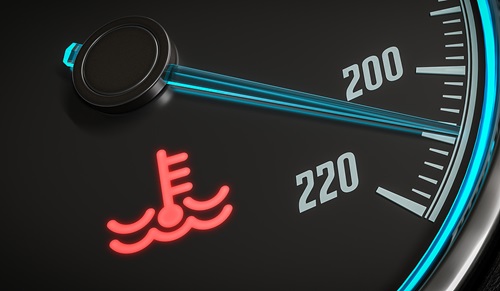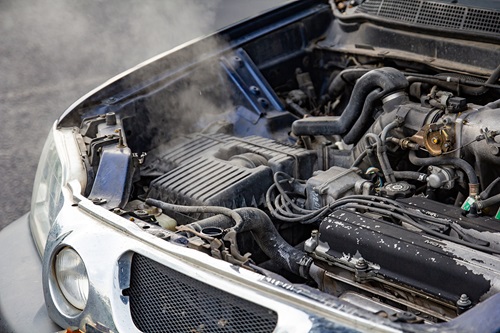You’ve had a great summer’s day out with the family and now it’s time to head home. The weather’s warm and the traffic is heavy. You notice a sweet smell in the cabin and think you can see steam coming from under the bonnet. Chances are the car’s overheating. Here’s why… and what to do next.
Why has your car overheated?
The whole point of a car’s cooling system is to keep everything running smoothly and within temperature parameters. When that system fails the car’s engine will start to get too hot. And nobody wants a ‘cooked’ motor.
As cars get older things start to wear out and the cooling system is no exception to that rule. Causes of failure could include a failing water pump, a leak somewhere in the system, a worn radiator fan, low oil, low coolant fluid or a thermostat issue, which means coolant won’t be flowing freely.
The warmer days of spring and summer bring with it extra cooling problems because the car’s engine is not getting natural cooling from, for example, cold air. As summer approaches, more cases of overheating are experienced by car owners.
How will you know that your car is overheating?

The first sign of trouble will probably be when the temperature warning light comes on in your instrument panel. The light is not difficult to mistake – it’s a picture of a thermometer, coloured orange or red. If your car has a temperature gauge, that could also be giving you bad news.
You might notice the sweet smell of engine coolant or the burning whiff of hot oil. Either of these pongs points towards a possible leak. And you might also see steam coming from under the bonnet. If, before you have even set off on your journey, you notice a pool of fluid under the car, that could be telling you that your cooling system is leaking.
If you see or smell any of these tell-tale warning signs, don’t ignore them. Carrying on regardless, and ignoring the signs, is a recipe for disaster as any of them could seriously damage the engine.
What should I do next?
The moment you suspect trouble in the coolant department there are a number of quick steps to follow.
First turn off your air conditioning if it’s switched on. And that’s quite likely if you are travelling on a warm day (when overheating is more common). Switching this feature off reduces extra stress on the engine.
Turn up your cabin heating. This might sound an unwelcome proposition, especially in the middle of summer, but it will draw heat away from the engine and into the car. You can always open a window.
You should then find somewhere safe to pull over and turn off the engine. Look for a secure layby and avoid the motorway hard shoulder if possible.
Let the engine cool down. Opening the bonnet can aid this but do so carefully, be wary of steam and don’t touch anything inside the engine bay.

Let the car cool for 30 minutes. When you are confident that temperatures have fallen to a controllable level you can think about topping up the radiator with coolant.
This can be done via the coolant expansion tank which will be sited near the car’s radiator. It will show you how much fluid is left in the system, and it will have a cap and opening through which you can add fluid. Protect your hands and turn the cap slowly as it might be under pressure.
Refill with coolant, checking the markings on the side of the tank for the correct level. Replace the cap and drive on carefully, keeping an eye on the temperature gauge.
If you have sprung a serious leak you might have to do this several times just to get home. Avoid using regular water. It will give a quick fix but over time, it’s likely to corrode and damage pipes and components inside the engine.
You will need to get any leak identified and fixed as soon as possible by an expert technician, a garage or workshop. If the overheating problem turns out not to be a leak, you should still seek expert advice as soon as possible – the heat problem is not going to go away.
Good quality coolant
Coolant doesn’t just cool an engine down – it helps to maintain a correct temperature for the engine to run safely and efficiently. Coolant also acts as an anti-freeze in the winter, reducing the chances of your engine seizing up.
Following this simple advice could save you from future trouble and an expensive repair bill. And that’s cool, right?
As always, we recommend checking a car's history before you buy one. It can help you avoid any pitfalls such as a car overheating.
